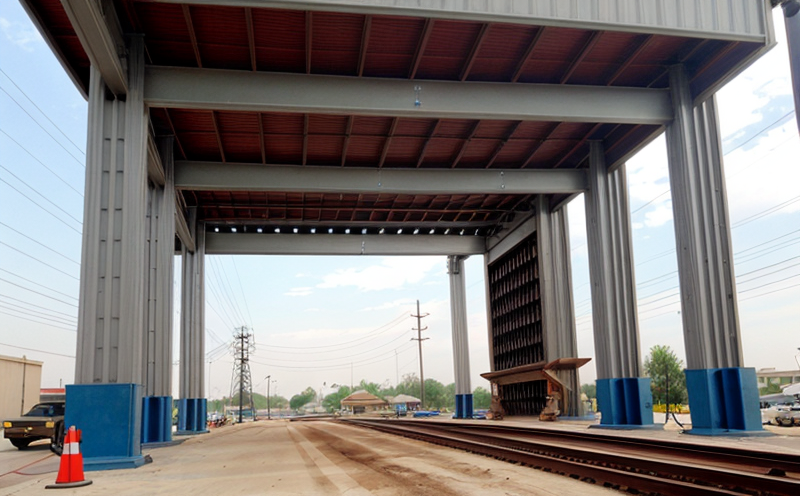FAA FAR 25.613 Material Property Verification Testing
The Federal Aviation Administration (FAA) Far Part 25.613 mandates material property verification testing for all airframe and power plant materials used in the construction of civil aircraft to ensure they meet specified strength, stiffness, and other mechanical properties required by aviation safety regulations.
Compliance with FAR 25.613 is crucial for manufacturers aiming to produce safe and reliable aircraft components that can withstand the stresses encountered during flight. This testing ensures material integrity and reliability under various environmental conditions, including high temperatures, low temperatures, humidity, fatigue, and impact.
The tests conducted pursuant to this regulation are designed to validate that materials used in critical structural elements such as wings, fuselage sections, engine mounts, and control surfaces comply with the stringent requirements set forth by FAR 25.613. These materials must demonstrate sufficient strength, ductility, toughness, and resistance to fatigue and corrosion.
The testing process involves a series of mechanical tests that simulate real-world loading conditions. The specimens are subjected to various types of stress, including tensile, compressive, shear, and flexural loads, using specialized test equipment capable of replicating the specific load paths encountered in aircraft structures.
Specimen preparation is critical for accurate testing results. Specimens must be cut from the actual production material or closely resembling it in composition and heat treatment to ensure that the test results are representative of the material's performance in service.
The instruments used in FAA FAR 25.613 compliance testing include universal testing machines, fatigue testers, impact testers, and other specialized equipment designed to simulate the specific loading conditions applicable to the particular component being tested. The data generated from these tests is then analyzed using sophisticated software tools that can predict how the material will perform under various operational scenarios.
The acceptance criteria for FAR 25.613 compliance are based on international standards such as ASTM, SAE, and ASME, ensuring consistency with industry best practices. The results of the testing must meet or exceed the specified limits set forth in these standards to ensure that the material is fit for use in aircraft construction.
Compliance with FAR 25.613 requires meticulous planning and execution, involving not only the physical testing but also detailed documentation and reporting. The test results are typically summarized in a comprehensive report that includes all relevant data, including specimen dimensions, loading conditions, environmental factors, and ultimate failure loads.
Failure to comply with FAR 25.613 can result in significant penalties, including fines, delays in certification, and even the grounding of aircraft models if materials do not meet specified criteria. Therefore, it is essential for manufacturers to ensure that their testing processes are robust and capable of producing accurate and reliable results.
Our laboratory offers a full suite of services designed to help clients comply with FAR 25.613. Our team of experts can guide you through the entire process, from specimen preparation to final reporting, ensuring that your materials meet all specified requirements. We use state-of-the-art equipment and follow stringent quality control measures to deliver accurate and reliable test results.
Benefits
Compliance with FAR 25.613 is essential for manufacturers who wish to ensure that their products meet the highest standards of safety and reliability. By adhering to this regulation, manufacturers can:
- Ensure material integrity in critical aircraft components.
- Meet stringent aviation safety requirements.
- Avoid potential penalties and fines associated with non-compliance.
- Enhance brand reputation through adherence to international standards.
- Reduce risks of product failures that could lead to accidents or malfunctions.
In addition, compliance with FAR 25.613 can help streamline the certification process by providing clear documentation and test results that meet regulatory requirements. This can reduce delays in obtaining certifications and approvals for new aircraft models.
Our laboratory’s services go beyond mere compliance; we provide comprehensive support to manufacturers throughout the entire testing process, ensuring that they meet all specified criteria with minimal disruption to their operations.
Industry Applications
| Aerospace Component | Description of Material Property Verification Testing |
|---|---|
| Wings and Fuselage Sections | Testing for tensile, compressive, and flexural properties to ensure structural integrity. |
| Engine Mounts | Evaluation of material strength under cyclic loading conditions to prevent failure during engine operation. |
| Control Surfaces | Verification of material performance in high-stress environments, including impact resistance and fatigue behavior. |
| Structural Adhesives | Evaluation of adhesion strength to ensure secure bonding between different materials in critical areas. |
| Composite Materials | Assessment of mechanical properties under various environmental conditions, including temperature and humidity fluctuations. |
The results of these tests are crucial for the aerospace industry as they directly impact flight safety. Ensuring that materials used in critical components meet FAR 25.613 requirements is a fundamental step in maintaining the integrity and reliability of aircraft structures.
Use Cases and Application Examples
- New Aircraft Model Development: Material property verification testing during the development phase ensures that materials used meet stringent safety standards before entering production.
- Production Quality Control: Regular testing of incoming raw materials and finished components helps maintain consistent quality throughout the production process.
- Aircraft Retrofit Programs: Testing materials in retrofitted aircraft ensures they are suitable for the specific environmental conditions encountered during operation.
- New Material Introduction: Verification testing is essential when introducing new materials to ensure they meet all specified performance criteria before being used in production.
The aerospace industry relies heavily on these tests to maintain safety and reliability. By ensuring that materials used in critical components are thoroughly tested, manufacturers can minimize the risk of failures and accidents, thereby enhancing overall flight safety.





